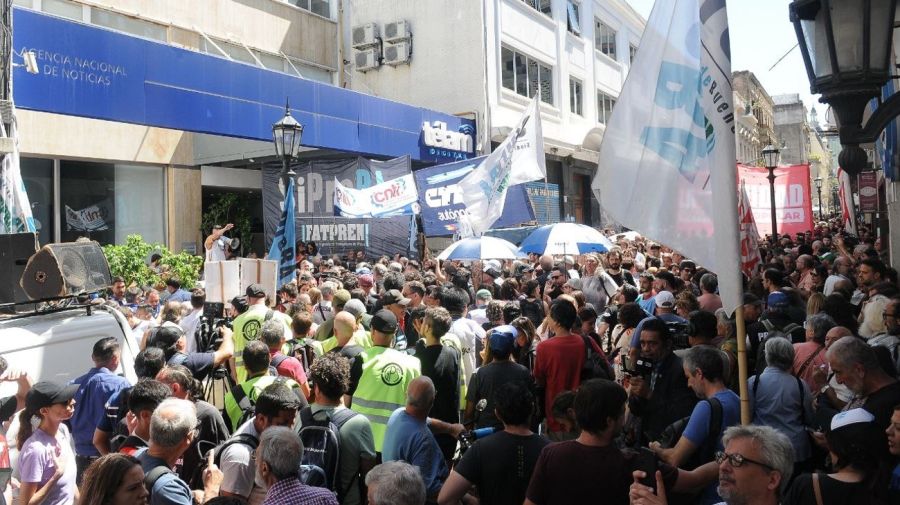President Javier Milei’s government on Monday suspended the work of the Télam news agency as his administration’s effort to shutter the state bureau began in earnest.
The swift move follows the president’s announcement in a speech to Congress last Friday that he would shut down Télam, an agency he described as a mouthpiece of "propaganda" for the previous Kirchnerite governments.
The 79-year-old news organisation, which has more than 700 staff, is the latest casualty of the right-wing leader’s drive to shake up and shut down state institutions since taking office in December.
When journalists arrived for work on Monday morning at Télam’s offices, they were blocked from entering the premises. Overnight the site had been fenced off and police officers stood guard at the door.
The agency's website was also down and replaced with a sign saying the page was “under reconstruction.”
"We found out last night [Sunday] that they had started to shut down after Javier Milei's disastrous announcement," Agustín Lecchi of the Sindicato de Prensa de Buenos Aires (Buenos Aires press union, SiPreBA) told a local radio station.
Presidential Spokesperson Manuel Adorni said at his daily press conference on Monday that the government had issued an internal statement "to all staff, exempting them from providing services for seven days with pay, while progress is made" to shut the agency.
‘Kirchernite’ tool
The president announced the closure of the agency during his speech marking the opening of normal Congress sessions, saying it had been "used for decades as an agency of Kirchnerite propaganda" – referring to the political ideology of former president Cristina Fernández de Kirchner, and her late husband, former president Néstor Kirchner.
In 2018, during former president Mauricio Macri’s administration, Télam went through a traumatic downsizing with the dismissal of 357 workers, some of whom were later reinstated by court order.
Télam was created as a mixed public-private initiative in April 1945 by then-labour secretary Juan Domingo Perón, who would go on to serve three terms as president.
In 1959, under the presidency of Arturo Frondizi, it was privatised and renamed "Télam Sociedad Anónima, Periodística, Radiofónica, Cinematográfica, Comercial, Inmobiliaria y Financiera.”
Four years later, after the overthrow of Frondizi in a military coup, President José María Guido closed Télam for allegedly "disseminating false and biased information." In 1968, it was nationalised by dictator Juan Carlos Onganía.

Today, Télam publishes more than 500 national news articles and 200 photos daily, as well as content for video and radio clients.
According to its website, the state news agency "is the only one in the country with a network of correspondents in all of the country's main cities and provinces.”
This regional role has taken on increasing importance following the 2017 closure of DyN (Agencia Diarios y Noticias) private news agency, which was heralded for its reporting in the nation’s more remote areas.
Freedom of expression
In a statement on X (formerly Twitter), a group of employees identifying themselves as ‘Somos Télam’ described the agency’s closure as “one of the worst attacks on freedom of expression in the last 40 years of democracy.”
Tomás Eliaschev, a journalist and union delegate at the state agency, criticised the “brutal” decision to shut out workers with “police and fences.”
He said he had received, like the rest of the employees, an email in the early hours of the morning notifying staff that they are “excused from work for a period of seven days with pay.”
"The agency plays a democratic role – not only are the jobs of 770 families affected, but also the right to information," Eliaschev argued.
He said workers are evaluating "all political, trade union and legal" measures possible to reverse the decision.
SiPreBA released a statement saying its members would gather at one of Télam’s buildings for a "symbolic hug" to protest the closure.
By midday, hundreds of people were protesting the agency’s closure outside the agency’s main offices in central Buenos Aires.
Eric Soto, a 27-year-old graphic designer, said the agency was crucial as it was "the only one" to report on events in remote provinces like Santiago del Estero or Tierra del Fuego.
‘Restructuring’
Milei, a 53-year-old political outsider, won a resounding election victory last year on a wave of fury over decades of economic crisis in the country, where annual inflation hovers at 250 percent.
The libertarian and self-described "anarcho-capitalist" is on a mission to slash state spending, deregulate the economy and shut down government-funded organisations he sees as serving "no purpose."
At the beginning of February, Milei’s government had decreed that the agency be placed under trusteeship for one year. The president intervened in the running of all state media in order to "modify the organisational and functional structure” of the bodies.
The measure affected public radio and television, Télam, the Educ.ar educational portal, the Audiovisual Production Centre and the Argentine Audiovisual Bank of Universal Contents (BACUA).
Adorni, who rejected allegations the move was an attack on freedom of speech, said on Monday that Télam had recorded losses of around 20 billion pesos (around US$23 million) over the past year.
"This has nothing to do with media pluralism or freedom of the press," he stressed.
Asked to explain why Télam’s website had been immediately shut down, he said it was to do with “restructuring” and would be “back online soon.”
"We will know the plan that the government is designing for the closure and the fate of each of the employees this week," Adorni said Monday.
The spokesperson said that the decision to fence off Télam's main building had been taken to "maintain security" and protect against "any kind of intrusion."
– TIMES/AFP/NA






















Comments